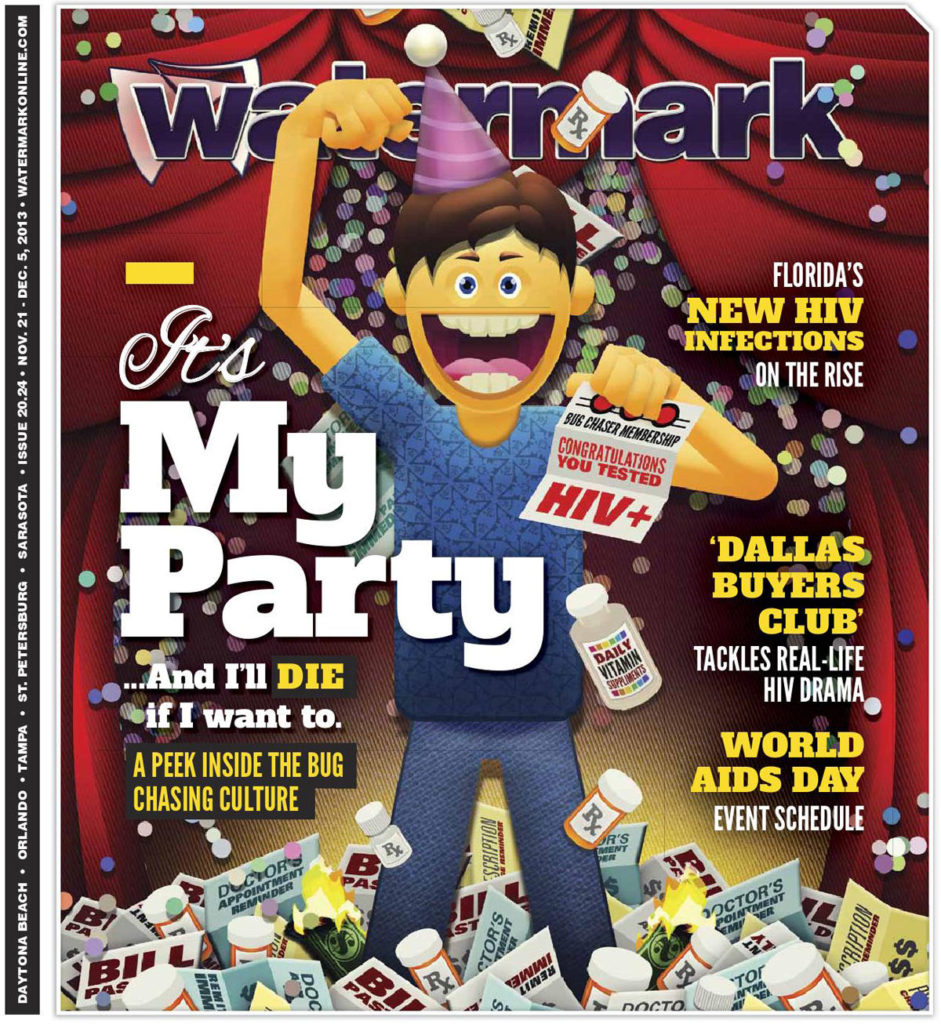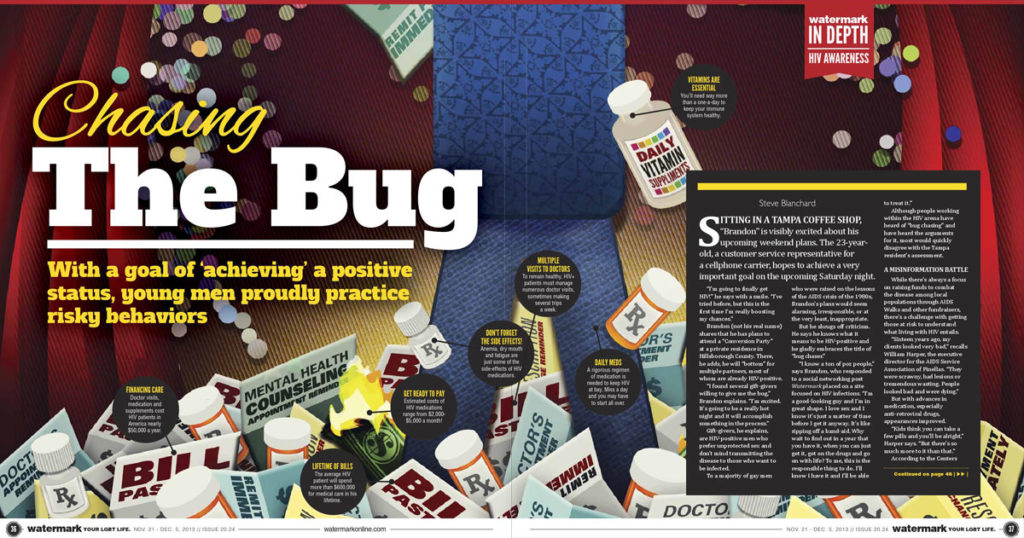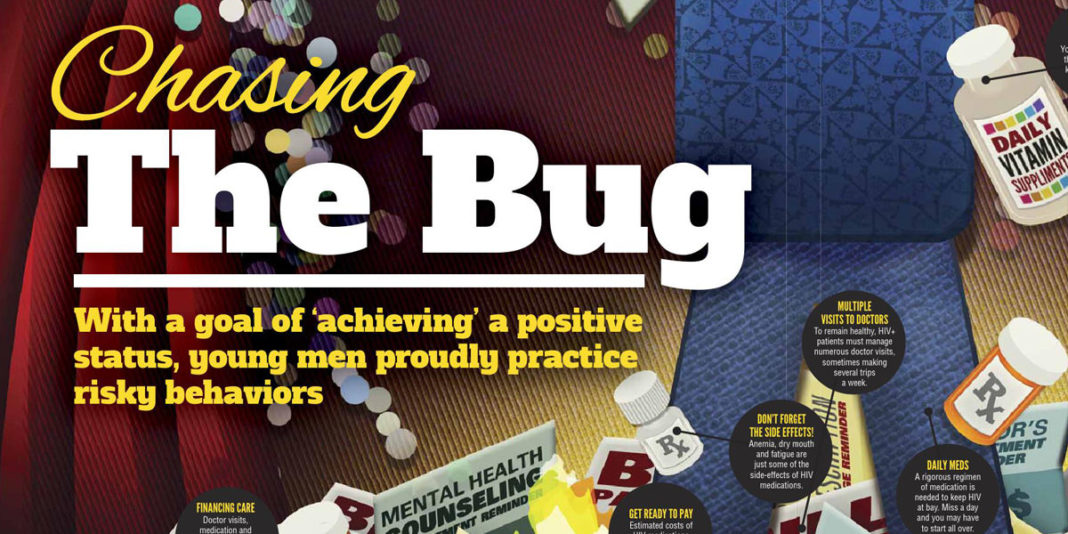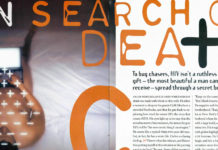Watermark Online tackled the issue of bug chasing head on in Issue 20.24 November 21 – December 5, 2013, with striking artwork on the front cover showing a very happy cartoon character of a young man holding a “bug chaser membership card” alongside the headline “It’s my party… and I’ll die if I want to. A peek inside the bug chasing culture.” Other headlines splashed across the front page include “Florida’s new HIV infections on the rise”, “Dallas Buyers Club tackles real-life HIV drama” and a “World AIDS Day event schedule”. The timing of the bug chasing article intentionally coincided with World AIDS Day on December 1.
The editorial on page 7 of the magazine introduces you to the person who wrote the article and more information about HIV in general. The article was written by Watermark Editor (at the time) Steve Blanchard who started his editorial with “If this issue of Watermark makes you uncomfortable, I’m glad. The cover story makes me incredibly uneasy — and I wrote it!” To research this article, Steve aimed to interview a number of guys to obtain sources for his article. Steve admitted to being misleading when he posted ads on two social networking/dating websites by asking if “any studs wanted to be injected by a PozTop” and his inbox was apparently flooded as a result. One of the websites was reportedly geared specifically to those seeking unsafe sex and the other one was dedicated to spreading HIV infections.
Steve admitted in his article that he hoped his story would disturb readers, because he wanted to make them angry and revealed this was his goal from the moment he put up the profiles on the dating sites in September. It’s always important to understand which angle an article is coming from and what the intention is, and we can immediately ascertain this from the editorial and also the wording and artwork chosen for the cover by referring to HIV as a death sentence, which it no longer is based on advances in medication now currently available (and was available at the time the article was originally published), which the editor did acknowledge, shortly before referring to his article as an “educational experiment”.

Once you scroll past 14 pages of advertising and a further 10 pages of articles, you will reach the “Chasing the Bug” article on page 32 of the PDF document (pages 8 to 11 are missing for an unknown reason), with the subheading “With a goal of achieving a positive status, young men proudly practice risky behaviours.” You can begin to understand more about the goal of the article when you study the artwork on the main page, with one standout piece stating in capital letters “Mental Health Counselling – Appointment Reminder”, which is extremely judgemental and demonstrates poor journalism in my opinion, as articles should be written from a neutrality standpoint so they are unbiased and impartial. There’s also some points made regarding financing care being about $50,000 a year, a lifetime of bills averaging $600,000, estimated costs ranging between $2,000 to $5,000 a month, some of the side effects, multiple doctor visits and daily medication.
The article begins on page 33 of the PDF document (and continues on pages 42 and 43 of the PDF document). Brandon (not his real name) is the first young man interviewed. He is 23-years old and hopes to achieve a very important goal on the upcoming Saturday night, revealing that he is finally going to get HIV, as he has plans to attend a conversion party at a private residence in Hillsborough County, where he will bottom for multiple partners who are already HIV-positive. Brandon explains more to Steve about his reasoning at a Tampa coffee shop and admits he will gladly embrace the title of bug chaser.
“I found several gift-givers willing to give me the bug. I’m excited. It’s going to be a really hot night and it will accomplish something in the process. I know a ton of poz people. I’m a good-looking guy and I’m in great shape. I love sex and I know it’s just a matter of time before I get it anyway. It’s like ripping off a band-aid. Why wait to find out in a year that you have it, when you can just get it, get on the drugs and go on with life? To me, this is the responsible thing to do. I’ll know I have it and I’ll be able to treat it.” – Brandon.
The second young man interviewed in the article is Travis (not his real name) who reveals he became infected with HIV at age 29. Travis explains that when he decided to become HIV-positive, he looked to websites trying to find a person to infect him. He joined several social websites that advertised bareback sex or conversion themes, but he found most of the guys he was interested in were too far away. So he realised that if he wanted to get infected locally, the best way would be to visit a bath house. Travis believes he contracted HIV during several encounters at an unidentified bath house in Central Florida, after he was there for nearly eight hours, where he approached men for sex by offering his “raw hole”. Travis reveals that three weeks after his night at the bath house, he tested positive for HIV and he is thankful to the unknown gift giver who passed along the infection.
“I found out I was HIV-positive on April 5, 2012 and that’s a date I plan to celebrate every year. I’m on the right drugs, I see my doctor regularly and I always disclose my HIV status before I have sex with someone. For me, getting infected was a way for me to start the next phase in my life. I knew it would happen eventually, so now I know my status, I have a drug plan and I’m very healthy. It’s better than finding out later that I have HIV and starting treatment too late. I know some bug chasers who compare getting infected with getting pregnant. I wanted to get it so I could go on with life. It has nothing to do with a relationship.” – Travis.
Dio Diaz is a prevention specialist from Metro Wellness and Community Centers who explains he has seen a lot of bug chasing over his years with the HIV community and it’s usually the younger community that have boyfriends and want to get infected because they don’t want to worry about getting infected anymore. That’s why they willingly contract the virus, with some admitting that it helps make their relationship easier if one of the partner’s is already HIV-positive. Dio added that a lot of people choose to become infected at bath houses.
“A lot of people who love to go to bath houses do it in the areas of Orlando, Tampa Bay and Fort Lauderdale. It’s a place to hookup to have random sex with random men, so that boosts the infection rates. It’s really a triangle for easy sex. If you’re into bareback sex or are bug chasing, these are great places, because it’s an environment that’s non-judgemental. There is someone there willing to do whatever you want and you’re also not forced into a situation you don’t want. If you don’t want a barrier, there’s someone there who is willing to not use one either. That’s a large part of the infection numbers.” – Dio Diaz.

The article included insight from Dr Jay Flicker, a psychologist from the Hope and Help of Central Florida who makes a distinction about there being a difference between a bug chaser who is actively seeking the virus and an individual who is complacent about contracting the virus. Dr Flicker explains that bug chasing is all about intent. “The intent of a bug chaser is to fulfil a need, whether it’s to find a sense of belonging to a group or if it’s what used to be called a disability queen. It was about getting those social services that just, really, aren’t around as much as they used to be.”
Abby Nicholson, who is the HIV Education and Prevention Coordinator at Metro Wellness and Community Centers shares an experience she had when she tested someone who came in and didn’t identity himself as a person who was looking to get infected. When his test result came back as positive, he said “finally, it’s done now”, which she revealed caught her off guard, then he told her that he tried to get infected for a long time and he had a lot of HIV-positive partners. He revealed to Abby that he was both relieved and excited by the result.
Dr William Harper, the executive director for the AIDS Service Association of Pinellas explained that before antiretroviral medication became available to improve the overall health of those who were HIV-positive, many people saw infections as a financial windfall, as there was a lot of money in the HIV arena, including money for housing, legal services, dental services and many found it attractive to become HIV-positive so they could access those services. Being HIV-positive even helped with rental assistance and housing vouchers, which meant that this was a financial windfall for someone who may not have had the resources, meaning some have found becoming infected as an attractive option.
The article did contain some helpful contributions from specialists in the HIV field and also included information about various strains and some of the effects HIV medications can have on people, as side-effects and treatments can vary from person to person, which makes the article worthwhile reading. There is also an interesting article written by Ken Kundis in the same issue titled “Preached to the converted”, which is also an interesting read, plus there’s also a page of HIV/AIDS statistics, and even though these figures are now outdated, it still shows some very clear information relevant at the time.
Further Reading:
- Watermark Online: Issue 20.24 – https://issuu.com/watermarkmedia/docs/2024-bugchasers
Featured Photo: Watermark Media
Article ID: CC030
Version Control: 1.0 – March 9, 2022: Original article published.







It was about May 2008 when I hosted my last party. It was at a clothing optional resort in Palm Springs, California called Camp Palm Springs and many gay porn stars attended, along with guys from around the country. I would fly in once a year to stay the week and host the parties for those who could not come out to NYC.
I started hosting in 1996. Monthly sex parties for guys who were HIV+, just because I wanted to find an HIV+ boyfriend. (how crazy. Right?) But the Idea took off go figure. However, I stopped hosting because the idea went “mainstream”. I’m rambling here, sorry. Maybe this might help… http://www.poz4poz.com/P4P-History.html
Robert Brandon Sandor
Thank you for sharing the history of your monthly HIV+ sex parties and also for including the link to your website, which I have found very interesting and I’m sure others will find the information you have shared useful as well. There’s some excellent resources at your website and I look forward to taking more of a look around. You aren’t rambling at all and I found what you wrote in your comment to be very insightful and I hope you would be willing to share more in the future. Please accept this as an invitation to share your knowledge and experiences here, as this is exactly what will help add more purpose to this resource, as various contributions from multiple people provide better perspectives. Thanks again for your comment Robert.
Jason;
Thank you for your reply and for the opportunity, I will consider sharing my unique insight regarding this topic. There’s more to the conversation of Bug Chasers and Gift Givers – there’s the foundation of HIV Prevention as a whole. The “concept” of HIV Prevention is solely based on one’s Freedom of Choice.
For example: No one can be a Bug Chaser or Gift Giver unless they disclose their HIV Status. Therefore, this PROMOTES HIV Status Disclosure (a good thing). Next, no one can disclose their HIV status unless they know their HIV status. Therefore, this PROMOTES HIV Testing (another good thing). As a result, it is our freedom of choice to have sex our way and make our own choices.
Needless to say, countless articles published over the past decade or two have failed to address these two items and, as a result – missed the point.
Jason, I will be off to London this Sunday (April 24) until May 6th; I’m producing a documentary series of my parties ( I have close to 5 BOXES of archives, emails, notes, research papers, publications etc) and interviewing a key figure of the parties – Vernon. Vernon is a dear friend that helped with the nightly management tasks. If you have any questions we can address let me know and Vernon and I would be happy to take a shot.
In closing, I’d like to introduce a preview of what’s to come: https://youtu.be/YCUIxWl8E6M HIV Prevention messages in America have changed.
Robert
Hello Robert, I do hope you will consider sharing more of your insight here in the future, and of course there’s no pressure for you to do so. I appreciate the discussion relating to all aspects of bug chasing, gift giving and HIV transmission, so any contributions would be greatly appreciated, as creating an open discussion is important and that’s what my website is all about.
I agree with you about the importance of HIV disclosure and regular HIV testing as well, so everyone knows what’s going on and can communicate their status as accurately as possible. I hope you have a safe trip to London and your documentary sounds extremely interesting and I look forward to tuning in once it has been released for public viewing. I do have more questions for you, but I might hold off asking them at the moment, because perhaps I can put together an article about your parties and incorporate this with the future release of your documentary. Thank you for the additional link – the video preview looks very interesting. I wish you the best with producing the documentary and I look forward to learning more in due course.
After reading this article I’m still committed to becoming HIV positive knowing that I could get AIDS
It’s important to do what feels right for you Alfred. I found the contributions from some of the people interesting, even though the article was geared in a certain direction.
Great article, and we never knew about the article in Watermark. But as you pointed out the writer had an agenda… The doctor interviewed, Dr. Flicker has a point but it’s not that black and white (actively chasing and complacent about getting HIV) I was more complacent I guess. The first time I was with a Poz guy that gifted people, he told me that all bareback sex is Poz sex especially here in south Florida. So, like in my case, I’m a bare only boy, and he said that that means I accept HIV. I’m still kinda that way, I guess that would be closer to his definition of complacency, but since 2 of my relationships are based on their/our HIV fetish, I’m not exactly complacent…. I don’t know if that makes sense, and also even though you’re HIV Poz, doesn’t mean you have to stop chasing. I think people outside of the community are trying to pigeon hole us so that they can make sense of it and perhaps even villainize us.
I’m glad you enjoyed the article Eric. This article was a few years old and my next article will be even older, but the next article is a lot more open-minded than the Watermark article was. The writer definitely had an agenda and incorporated a combination of words and artwork to push his opinion. I agree that bug chasing is not black or white and I do think the articles like this one that appear in publications are not designed to help us, they are designed to stir up the debate and make people angry and of course that anger then gets directed toward us. I still believe it’s important to share these articles so we can read them and see what people are saying about us, as it will help us become stronger by not letting what other people think or say affect our mindset. There are people in the world who would love nothing more than to damage our spirit, which is why we need to see what’s out there and create a stronger mindset, which will then enable us to understand ourselves better and also help us accept who we are, which is what’s really important here. I do think it’s good to see what the professionals have to say and in this case, what Dr Flicker had to say made you think about whether you fall into the complacency or chaser category and I do get what you’re saying, as the professional opinion does not offer a category that matches your situation, which is why it’s important for us to consider all the options available, because not everyone does. You are spot on about some people outside of the community trying to pigeon hole us, which is why it’s good to talk about this openly so we can explore all the options.